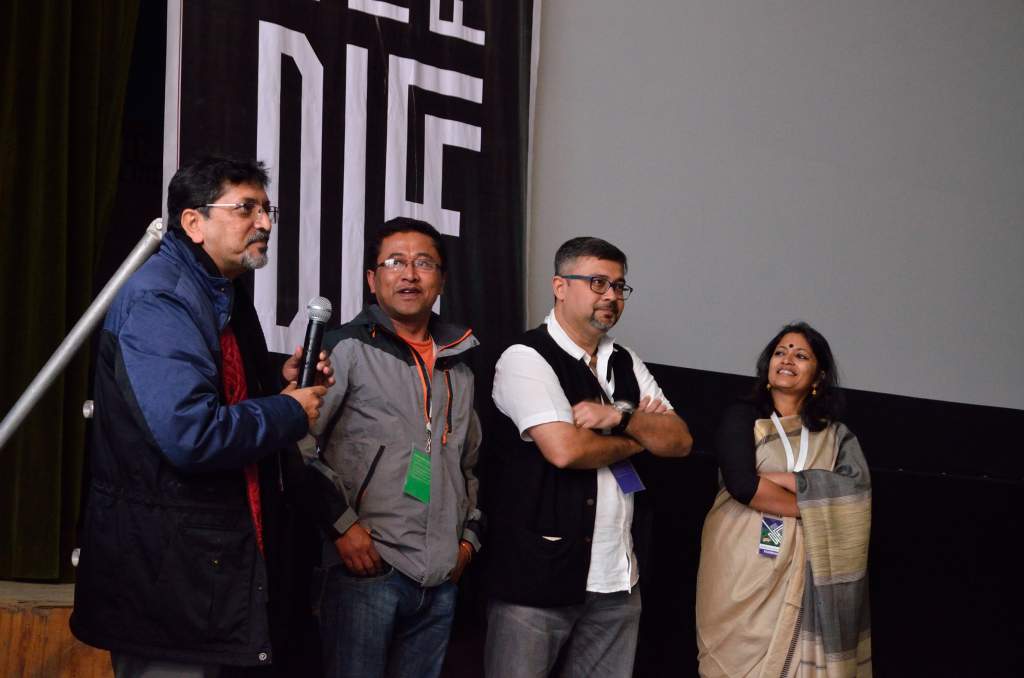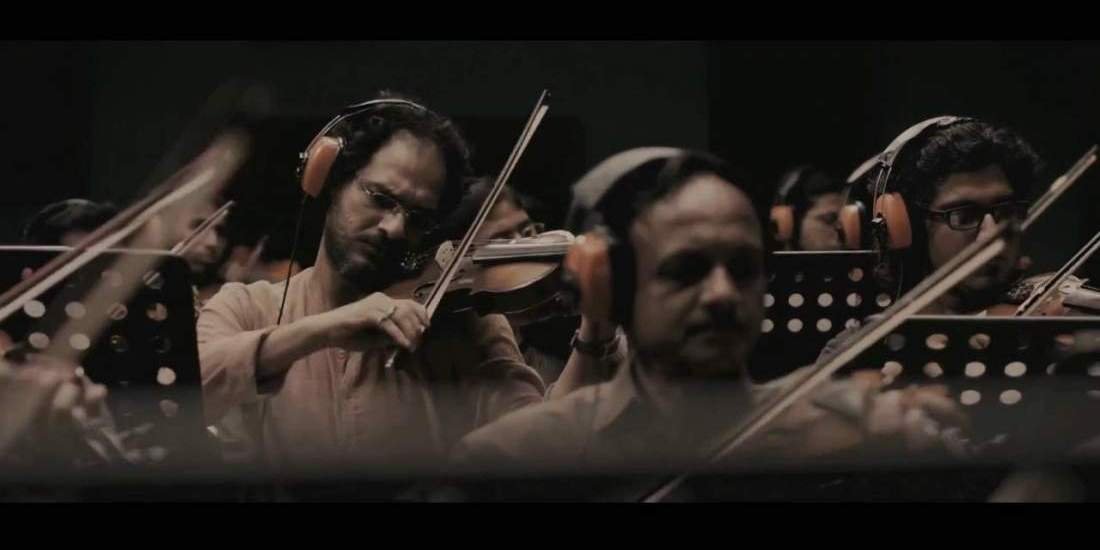The Violin Player: A statement on life with and without art
When The Violin Player that features stellar actors like Adil Hussain, Ritwick Chakraborty, Nayani Dixit and Sonam Stobgais played at the fifth Dharamshala International Film Festival, it left the audience awestruck. This 72-minute Hindi film is a ‘story of one day in the life of a Bollywood session violinist who finds expression in an unlikely place. The day unfolds to reveal startling truths about music, art, life and survival’. When we got into a dialogue with the film’s director Bauddhayan Mukherji and his producer-wife Monalisa Mukherji, who are known for the Bell Bajao campaign, their creative thoughts and sincerity made this an endearing conversation.

Bauddhayan Mukherji and Monalisa Mukherji
You have often spoken about the fact that The Violin Player was inspired from your friend’s life. And you have terrifically weaved that real story in fiction; what was the writing process like?
The end goal was very clear, which was to make a statement on life with art and without art. So we had the end goal and the writing process was about finding and meandering through the lanes to reach this goal. But the end was always in sight.
How and why did you zero in on Ritwick Chakraborty for the lead role?
It is Ritwick’s debut Hindi feature film. My editor Arghyakamal Mitra suggested his name during one of our conversations when we were discussing the film. I shared it with Mona (Monalisa Mukherji, producer) because she takes the final calls on casting. Mona had expressed her desires to work with Ritwick a long time ago after having seen one of his telefilms. He was brilliant; a ticking bomb ready to explode. As soon as Argho da suggested Ritwick’s name, Mona decided to get him on board. It took us a while to figure things out. Ritwick is also a very busy actor in Bengal. So to get someone to dedicate two months to learn the violin was the decisive factor. And Ritwick thankfully is an actor, not a star, though in his own right he could very well be a star but he is more of an actor than a star, so he agreed to give us the time.
What about Adil Hussain who has given such as phenomenal performance in The Violin Player?
Adil was not our first choice. We had a huge date issue with our first choice and that’s when our team started looking at prospective actors and we were kind of unanimous about Adil. I flew down to Delhi, met him and narrated the story. Till the penultimate scene during the narration, Adil had made up his mind that he didn’t want to do the film. Then came the last scene and when Adil heard it, he said that is what he stands for in life and hence agreed to do the film.
Adil has been a huge pillar of strength in terms of trying to reach out to people. He has been an absolute messiah as far as this film is concerned. For us being unknown entities, technically speaking, Adil is the only known face in the film. So he realized that he has a great responsibility on his shoulders and has played his part to perfection till now.
In what ways has he been involved?
He has been talking about the film to friends and making sure that there is a buzz about it whenever we go to any festival. In fact, Adil was the one to call and tell me that The Violin Player had been selected at the Durban International Film Festival because the programmer saw the film and called up Adil and not our sales agents.

A still from The Violin Player
If I’m not wrong, it is said that the film was shot on a shoestring budget. What sort of problems and challenges come up in such a case?
This is the most planned shoot that I have ever done in my life. It was designed to be a ten-day shoot and ended being so with the exact number of shifts that we had planned for. So technically, it couldn’t have been planned any better. Hence, the credit goes to my team, primarily helmed by Mona. She figured the design production schedule and we worked according to it. So Mona did costumes, dialogues and production design along with producing the film.
When the two of you work on a project, is it a husband and a wife working together or a director and producer?
Bauddhayan – That’s a tricky question. Because whatever I say, she never agrees with me.
Monalisa – Both. It has to be a combination of both. Sometimes I have to act as a wife and do nasty things – say and control, use veto power and throw tantrums. Or I just end up telling him… theek hai bas apne aap karlo, mera kuch lena dena nahi hai (Do it yourself, I have nothing to do with this) And then he agrees to what I’m saying. (laughs)
Bauddhayan – So whenever she walks out, I know that when I’ll go home, things will be problematic.
Monalisa – We both share similar kind of work experience. He respects my experience. He does not behave like stereotypical husbands. There is mutual respect, faith and trust between us and we don’t ignore what the other person has to say.
Your last film Teenkahon traveled to various festivals for a year before its theatrical release. Do you have similar plans for The Violin Player?
I believe the film’s digital release will happen before its theatrical release.
Won’t it harm the business?
Bauddhayan – No, it won’t harm the business. In any case, the kind of film that The Violin Player is, it will only be a very small theatrical release.
Monalisa – Also in a 72-minute film, it won’t be possible for theater owners to do their business and sell popcorn because they won’t have time for that.
According to you, how important are festivals in promoting such films?
Bauddhayan – Very interestingly, Teenkahon went to 51 festivals so far but at the time of release we took all the laurels off the poster because for the audience, it needs to be a virgin film. One perception is that it is a festival film and will be boring and the other is that everybody has already seen it. People start building perceptions about the film, which is why Viacom 18, the distributors of the film, made it very clear to not add any festival laurels to the film’s poster at the time of release. Since the film didn’t do really well in the theatres, we can’t say if that was a correct decision or not.
Monalisa – It didn’t do that bad either. Once a TV journalist asked me a question about the film after its release. He asked me how has the response been and he was mainly trying to criticize the film. I just told him, “Main ticket ke pese leke hall ke bahar khadi thi (I was standing outside the hall with the ticket money). If anyone didn’t like the film, I would return the money. But I didn’t come across any single person. Everybody really appreciated the film. And it is not just our friends and family but every other person who said that.

After the screening of The Violin Player at DIFF 2016: (L-R Raman Chawla, Sonam Stobgais, Bauddhayan Mukherji and Monalisa Mukherji
Your company Little Lamb Films has been doing some great work since 2007. With brands getting into very different and purely content based promotions these days, are you’ll witnessing more scope now in terms of storytelling than what it was when you started?
Bauddhayan – As filmmakers, we have far more scope but the budgets have shrunk. As soon as you get into digital films and by that we mean things that are meant only for a digital release and not TV or cinema halls, you are allowed to become a filmmaker but the compromise is to do it at a less cost. That’s the carrot which the client hangs in front of us. People who have suffered are the bigger players and not the smaller ones.
Monalisa – The digital platform has made it very good for the clients because they still have a big platform to showcase their stuff. But that is not the case with filmmakers.



